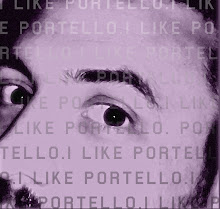One of the things that's been notably lacking is a decent blog description, so I've added one. It's repeated here for posterity, as it's reasonably likely it will change at some point:
"The adventures of a science groupie and atheist lost in an increasingly superstitious world."
I think that's a reasonable summary.
The superstitious nature of our culture is up for discussion, of course. And my atheism is something I've been happy to explore here.
But science groupie-ism?
What I'm trying to express is my somewhat inglorious position as a fan of science, who never actually does anything particularly scientific in his working life.
I completed a general science degree at University, majoring in Maths and minoring in Chemistry, but in my third year I dropped everything else to fill my timetable with every Maths subject I could find.
This was followed by an Honours degree in Maths and finally a job doing Actuarial work, essentially the statistical analysis of insurance products.
So mathematics has played a big part in my academic and professional life. But maths, while used for science, is not itself a science. It's really an extension of pure philosophy.
It just happens to be one of those rare branches of philosophy that occasionally stumbles upon something useful. (Cue angry retorts from Logical Positivists).
But the point is that even though I'm not doing science, I'm still a big fan of science.
I love the excitement of scientific discovery . . . the examination of clues, the dissection of evidence and the proposal of theories and models to explain our often very strange reality.
I love reading about palaeontology and astronomy and quantum physics.
I love celebrating great scientific achievements, like landing the Phoenix on Mars.
I get all excited about the possibility of devices like the Large Hadron Collider, due to go online in August and hopefully reveal all sorts of amazing things.
So I'm just a science groupie. I'm happy to be the guy cheering at the sidelines, and happy to bask in the reflected glow of great achievements.
And if Stephen Hawking comes to visit, I can't promise I won't be the guy chucking my
Again.



3 comments:
I think "Science Groupie" sums you up well, and it's good you can wear it proudly on your sleeve.
Of course as a student of philosophy I object to what you have to say about it. Not the implication that it's not useful (you don't go through an arts degree without getting at least a little thick skinned about such jibes) but more that you consider maths an extension of it (and I'm sure you mean it out of respect).
Sure there are crossovers, but I feel those crossovers are more in personnel - and out of convenience - rather than necessarily in ideology. There was a time when a philosopher could get credence for some of his mathematical ideas, because he was a philosopher. But it's like kylie's singing career, or Megan Gale's acting. It's about using your influence in one area to kick start another. Just cos one person does 2 things, doesn't mean they are the same thing.
The disciplines are looking for different kinds of answers in different ways.
Maths, even real out there maths, is looking for absolutes.
Philosophy, or at least the bits I like, doesn't do that. The true spirit of philosophy, the one that I get into, is the idea that, if you can ask the right question, what you will get in return is a whole bunch more questions. And if you're lucky, none of them will have answers! But in working out ways to respond to these questions we learn all sorts of things about ourselves and about humanity.
I know you'll respond with "but that's what Maths does!".
And good for you. It's your blog and you're allowed to believe what you want.
Megan Gale... act... good!
I disagree that Maths is about looking for absolutes.
When you're solving equations you might be looking at absolutes in the sense that there's only one set of correct answers, but that's not really what maths is about. That's like saying philosophy is about reciting philosophical tracts without thinking about what they mean.
Maths is about proposing and proving theorems. Every theorem is based on stated assumptions, and so every theorem begs the question . . . what happens if we change some of those assumptions?
In that way, every theorem will lead to new questions.
This is what professional mathematicians do, and this is how new mathematical discoveries continue to be made.
It's the same in philosophy. A philosophical argument breaks down to the premise (assumptions) and the conclusion (theorem).
Both mathematical and philosophical arguments must be based on valid formal logic. Plato laid down the structure for this millenia ago, and it hasn't changed.
Scientific argument, on the other hand, relies on a logical fallacy that wouldn't be acceptable in a mathematical or philosophical context.
In science, arguments run like this:
"If my hypothesis A is true, then I'll observe B. Oh look, there's B. This is evidence for my hypothesis A."
A philosopher will state that there are any number of other things that could be causing us to observe B. It doesn't prove that A is true at all. And a mathematical argument like this would be laughed out of the lecture hall.
But in the science world, this is evidence. Observation and evidence.
And if enough observation and evidence of this kind accumulates . . . if every time you do A you get B, and nothing is found to contradict it, then eventually hypothesis A becomes accepted.
But hypothesis A is always vulnerable to being overturned if a better argument comes along, and we see this over and over again.
A sound philosophical or mathematical argument has no such vulnerability.
Post a Comment